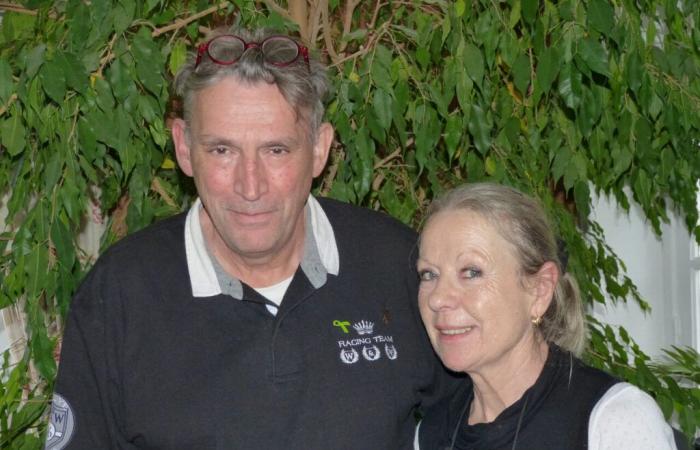Par
Arnaud Gicquello
Published on
Dec 15 2024 at 2:52 a.m.
See my news
Follow News from the Pays de Redon
Emmanuel Payen’s life turned upside down in 2016, when his heart decided to give up. Since his successful transplant, the Redonnais man has been keen, with his wife, to tell his story and raise awareness among fellow citizens of the importance of organ and tissue donation to save lives. According to him, the best way is to talk about it to those around you.
“You can save lives while you are alive by letting people know that you are an organ donor. » This is the message that Redon resident Emmanuel Payen tirelessly wants to spread, heart transplant recipient and volunteer within the Association for the Donation of Human Organs and Tissues (ADOT) of Ille-et-Vilaine, a departmental association resulting from France ADOT, the national federation founded in 1969 at the initiative of the Nobel Prize winner in physiology and medicine, Professor Jean Dausset, which raises awareness of organ and blood donations fabrics.
It is with this aim that Emmanuel Payen and his wife Marie-Antoinette organized a meeting, on December 4, at the Maison des associations de Redon, open to members of the Redon sector and members of the Municipal Office of culture and leisure (OMCL).
“Live 15 days or 25 years? »
The meeting notably allowed Emmanuel Payen to testify and retrace his history. Originally from the Paris region, a dental surgeon and independent researcher whose writings and patents have been recognized, the latter saw his life change in the mid-2010s, as fatigue gradually took hold of him.. “Admitted to the emergency room in August 2016, I was diagnosed with heart failure. My birth heart was at the end of its tether”he says.
His condition is deteriorating day by day. To continue living, the transplantation of a new organ then becomes the only way out. “The doctors clearly asked me the question: “Do you want to live another 15 days or 25 years?” »
Emmanuel Payen is then placed on the waiting list to receive a new vital organ. “However, a compatible heart had to be available. » While his hours seem numbered, he may benefit from an organ at the very last moment. “I almost wasn’t in this world anymore”he confides.
But the ordeal does not end there. Complications followed after the transplant carried out on September 27, 2016: nosocomial infections, hemorrhages, etc. “I came very close to having my left foot and right leg amputated. I didn’t leave the hospital until the end of 2016. I was in a wheelchair then. »
After a long convalescence, Emmanuel Payen was gradually able to return to normal life. “My entourage and my wife in particular have been an extraordinary support for me. Today, my heart allows me to practice tennis, with the health sports section of the Redon club, and golf”underlines Emmanuel Payen, who also devotes himself to painting, notably producing reproductions of paintings by famous painters, such as Turner and Monet, and continues to write professional articles.
“I don’t know anything about my donor”
Nothing is more present than a heart: it beats, its rhythm accelerates and slows down depending on effort or rest, anxiety or tranquility. “The heart is shaped like an urn. It is a sacred vessel full of secrets,” writes Alfred de Vigny in his “Journal d’un poet.” Words that Emmanuel Payen could use as his own: “I know nothing about my donor, only that his death kept me alive. I’m here because he said “yes”. His heart beats in my own body. Every day, every act performed is a tribute to my donor”admits Emmanuel Payen, for whom “Gratitude is a feeling that only has value if it is expressed.”
The person concerned does not forget his other benefactors, that is to say “all the people involved in this great human chain, from the prestigious surgeon to the service staff, nurses and caregivers, from the gendarmerie escort to the airplane pilot, including airline cabin crew.”
No deviations possible in France
A recognition shared by Marie-Antoinette Payen, very committed alongside her husband. The trials they experienced together only strengthened their deep desire to act for others. “Telling those around you, while you are alive, that you are a donor helps save lives. » Indeed, “if there is any doubt at the time of death, the relatives are questioned. If they know that the deceased was a donor, to the pain of learning of the disappearance, there is no added difficulty of choice. she continues. “The needs continue to grow, as unfortunately does the rate of refusal of samples. One of France ADOT’s missions is also to reassure. »
There are indeed many preconceived ideas about organ and tissue donation. This is evidenced by a sad news item that occurred in 2021 in the United States, but only relayed by the media last October. An American patient, considered brain dead, woke up before his organs were removed. The announcement caused a widespread movement of concern and a sharp increase in refusals of donations in France.
“This situation would be impossible in France”reacts Emmanuel Payen. The diagnosis of brain death follows very strict protocols, carried out by several doctors.
These procedures provide for a series of examinations, notably by imaging, which leave no room for doubt. “The diagnosis is first established by a clinical examination: reflex tests show that the brain stem is no longer functioning. Then, the medical profession must perform two electroencephalograms at least four hours apart to verify that there is no electrical activity in the brain. The diagnosis is also based on brain imaging, by injecting a contrast product to verify the complete interruption of vascularization. »
After a decline linked to the Covid-19 pandemic, organ transplant activity increased slightly in France, by 2.5%, in 2023 compared to 2022 with 5,634 transplants carried out, according to data from the Biomedicine Agency (ABM).
Remedy the “French paradox”
A worrying point, the rate of opposition to organ donation for patients who died of brain death shows “a significant increase”according to the ABM, by 9.4% compared to the previous year: it increased from 30% in 2019 to 36.1% in 2023“and even 37% at the end of the year, after the publication of the news item in the United States”according to Emmanuel Payen. However, more than 21,800 patients were waiting for an organ transplant as of January 1, 2024, including more than 11,400 on the active waiting list. And 823 patients did not survive this wait.
Faced with these figures, “it is essential that the refusal rate drops in the coming years”say Marie-Antoinette and Emmanuel Payen. “We can speak of a French paradox. If 80% of citizens are in favor of donating their own organs after death according to opinion studies, then the opposition rate should peak at 20%, not 37%. »
“Too few French people have expressed their position to their loved ones, who, due to lack of knowledge of the wishes of the deceased, prefer to report opposition”they recall. “However, since the same person can donate several organs and tissues, a simple “yes” can save four or five lives. »
Redon will soon be an ambassador city for organ donation. On the occasion of the meeting organized by the ADOT of Ille-et-Vilaine, on December 4 at the Maison des associations, Françoise Foucher, first deputy, announced that Redon would become an ambassador city for organ donation from 2025 .
France ADOT website: www.france-adot.org.
Follow all the news from your favorite cities and media by subscribing to Mon Actu.






